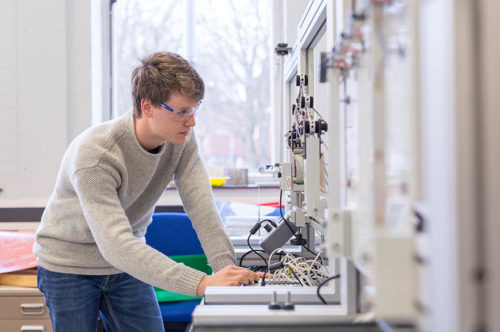Civil engineering is all about people. From supplying energy and clean water to our homes, to processing and recycling our waste, civil engineers work on developing services and facilities we use every day.
On this Civil Engineering degree, you’ll study fundamental engineering principles, underpinned by mathematics, health and safety, and sustainability. You’ll learn how to use industry-standard software for the design and construction of civil engineering projects. There are also opportunities for field trips and work placements.
Each Civil Engineering course is designed with senior industry professionals to ensure you are highly employable and a valuable addition to any area of the industry. This course is also available through Network75, a combined work and study route.
What you will study
Our Civil Engineering courses are designed to ensure you are highly employable and a valuable addition to the industry. The areas you will study include all the subjects necessary to meet the expectations of employers, preparing you for a career in this challenging and rewarding field.
Project modules are based on ‚live’ schemes, supported by guest lectures from professional engineers. Where appropriate, field courses are included to consolidate the knowledge gained in class and help you apply it in real-life situations.
Year One: Civil Engineering degree
- Conceptual Modelling and Sustainable Design
- Engineering Maths 1
- Structural Analysis and Design 1
- Site Practice and Surveying
- Construction Materials
- Thermo-Fluid Mechanics
Year Two: Civil Engineering degree
- Civil Engineering Practice
- Structural Analysis and Design 2
- Sustainable Design Project
- Engineering Surveying and Highway Design
- Geotechnics and Hydrology
- Analytical Methods and Hydraulics
Year Three: Civil Engineering degree
- Individual Dissertation
- Integrated Project
- Structural Analysis and Design 3
- Civil Engineering Design and Applications
- Civil Engineering Management and Business
- Environmental Management and Sustainable Transport
- Geotechnical Engineering and Environmental Engineering
Teaching
Our lecturers are experts in their subject areas, having worked in, or with, industry, conducting research, presenting at conferences, publishing their work, and informing your studies with the latest insights. Not only will you be taught by academics who are specialists in their fields, but you will also benefit from guest speakers from the engineering world. An open-door policy ensures that support and advice from academic staff is always available during your studies.
The BSc (Hons) Civil Engineering degree offers a combination of theory and practice, so there is a balance of lectures, tutorials and practical sessions. Many modules require coursework only, while others are a mixture of coursework and exams.
Project modules are based on ‘live’ schemes, supported by guest lectures from professional engineers and, where appropriate, field courses are included to consolidate the knowledge gained in class and help you apply it in real-life situations.
Part-time Civil Engineering students can follow an embedded professional qualification route, which gives them the opportunity to achieve a professional qualification while studying and working.
Assessment
The Civil Engineering degree is assessed by assignments, coursework, class tests and presentations. Presentations are included as elements of assessments in some modules, in order that key communication and presentation skills can be developed.
Zobacz więcej na stronie uniwersytetu >>
Wiza studencka do Wielkiej Brytanii
Aby studiować w Wielkiej Brytanii potrzebujesz wizy studenckiej. Aby złożyć wniosek o taką wizę studencką musisz zdjać certyfikat językowy na poziomie B2.
Uważaj! Do celów wizowych musisz wybrać wyłącznie egzamin w wesji Secure English Language Test (SELT) UKVI .
Co to jest test SELT UK VI registration? Przeczytaj więcej o testach SELT UKVI >>




















